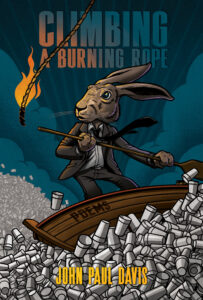John Paul Davis
News
Climbing A Burning Rope
My second book of poetry, published by University Of Pittburgh Press, is out now.
Inasmuch as poems can be “about” something, the book is largely about what it’s like to work in our economic system and society, what Vanessa Machado de Oliveria called “coloniality modernity” and Martin Pulcher calls our “resource-extracting way of life” and what almost everyone calls “capitalism.” I began writing it when I was working for The Largest Advertising Agency In The World - the absurdities and Kafkaesque systems of such a large company had me reflecting on my history as a worker.
Over the decades I’ve had all manner of interesting jobs, partly because when I was growing up my family was poor. Not homeless-poor or shoeless outhouse poor, but definitely below the poverty line, drinking-powdered-milk, me-wearing-hand-me-downs-from-my-sister, had-no-health-insurance, one-paycheck-away-from-distaster poor. So I had my first job when I was 12, which was a survival choice, not a pocket money choice. I had three paper routes, and what I used the money for mostly was to buy clothes and school supplies, and, often, food, necessities a 12-year-old should ideally not have to be thinking about at all. (To be clear, my parents fed my sisters and I, but I was always hungry, and so I often spent my paper route money on food).
My father got laid off for the third time in a decade when I was 15, and he remained either unemployed or working retail jobs (instead of being able to put his bachelor’s in engineering to use) until I was almost out of college. That meant that I had to put myself through college, and I had to hold down a full-time job as well, so that I could eat. When my friends were having the kind of college experience one sees depcited in film and television, I was stocking grocery shelves or waiting tables or working the line in one restaurant or another. I don’t regret it; I learned a lot from those experiences, and often, I enjoyed the work. It was also easier for me than for many of my coworkers because even then I understood I wouldn’t be working these kinds of jobs forever; eventuallty I’d graduate and enter the “white collar” workforce. It also meant that, when, after graduating college, I couldn’t find employment in the professional-managerial class, I had no qualms about finding another working class job; after college I worked for some years in such roles until I finally managed to start getting work doing something I’d not gotten any schooling for at all: desiging and programming web pages.
Over the years I’ve been a paperboy, a roller-rink deejay for Christian rock night (I’d sometimes scandalize the holy rollers by playing a track by U2 or Amy Grant or MC Hammer - Christian enough that they couldn’t fire me, but secular enough to see the youth pastor squirm out there under the disco ball), a concession stand short-order cook, a grocery bagger, a movie theatre projectionist (back when films were projected through actual film), a cater waiter, an event manager, a warehouse manager, a busboy, a dishwasher, a line cook, a delivery driver, a baristo, a writing tutor, a substitute teacher, a bookseller, a bicycle messenger, a college professor, and most recently, as mentioned above, a maker of web pages. I’ve spent the past six years writing about all of that as well as office culture.
But that isn’t the only work the book addresses. There are other kinds of work; for example, what some corners of the internet call “emotional labor” but which I prefer to think as of “good works,” (to borrow a religious term) or maybe just “love,” that is, the work we do to be in community or relationship with other people. And then there is what Ivan Illich called “shadow work,” which is the work we do in order to create the right conditions for our paid work. This includes things like commuting to an office, relating to our colleagues, learning how to select appropriate outfits, running a household such that we can be on time to work and be well-fed and well-rested to do it. There is also what I think of as “spiritual work”, which is work none of us can escape (just like all the other kinds) whether we think of ourselves as spiritual beings or not. Spiritual work is the work of understanding ourselves, our motives, learning to align our behavior and choices with our values, learning to stand up for ourselves, learning to love ourselves and others truly, not just when it feels good, learning how to forgive, learning how to let go, learning how to accept suffering when we’re powerless to avoid it, learning to accept it when we have the power to avoid it but avoiding it would cause others suffering, learning to find joy and be at peace.
The book is called Climbing A Burning Rope, and I’m pretty proud of it, and I can’t wait for folks to read it.
